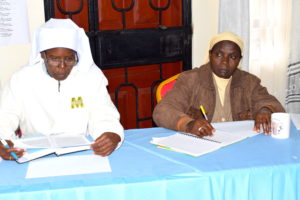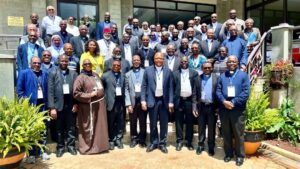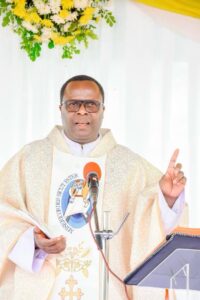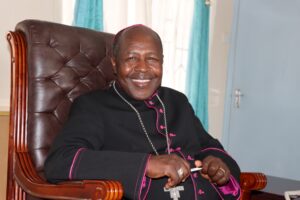ACWECA: Chapter Preparation, Choice of Delegates a Solution to Successful Chapter Celebration

Participants in an ACWECA formation workshop consult with Sr. Jacinta Auma Opondo, (Left - seated), Credit: ACWECA
Sr. Grace Candiru, MSMMC
A Kenyan Franciscan nun has said that the success of any Religious Chapter depends on its preparation and the choice of the chapter delegates.
Sister Jacinta Auma Opondo who is a canonist and currently lectures at Hekima University College said success could only be seen after the elected leadership team has implemented the mandates given them at the end of the chapter sitting.
Sister Jacinta FSSA who was facilitating two of the sessions of Conrad N. Hilton Foundation funded chapter facilitation training organised by the Association of Consecrated Women in Eastern and Central Africa, (ACWECA) said it was not uncommon for congregational leaders to come to the end of their mandate without implementing the chapter mandates. She attributed some of these challenges to lack of proper procedures regarding chapter celebrations.
“Lack of clear procedures is a significant challenge that should not be taken for granted,” she said. She advised congregations which lack such procedures to bring them up as part of the weighty matters to be discussed in a chapter and then have them included in the proper laws of their congregations.
While there is ardent need to provide for clear procedures in the proper laws of congregations, she said it was important to ensure that congregational leadership teams respect these procedures. On the basis of the above, she said it was important that delegates to a chapter have pure intentions for the greater glory of God and the better governance of the institute.
When it comes to the election of congregational leaders, Sister Jacinta said delegates should be able to ask such questions as: “Are the people we are electing capable of implementing the mandates of this chapter?”
She further highlighted an issue that could invalidate decisions of a chapter, namely having more ex-officio members to a chapter than elected delegates.
Meanwhile another facilitator at the training underscored the role of chapter facilitators as that of being in charge of the process but not the content.
“Your role as a facilitator for effective Religious chapter is not to give workshop but to facilitate the process of the chapter,” Sr. Hilda Bamwine said, adding that it was the duty of the members of the congregation to discuss the issues of their congregation with minimum interference from the facilitator.
Sr. Hilda, a member of the Society of the Sacred Heart of Jesus, observed that chapter delegates often come with different spirits – tribalism, power struggle, and the like, but cautioned facilitators to guide delegates away from these, so they can concentrate on the chapter. She said facilitators need to see themselves as outsiders by not endorsing the contributions of the delegates.

“If congregations adequately prepare for their Chapters and make the right choices of the Chapter delegates, half of the process would be done,” she said. As such, she said it was important that members choose delegates who are relatively well accepted across the divide, saying they should be people who are free with members of the congregation and can communicate freely.
“Having this calibre of people will help the congregation to rediscover its actual needs and spur the delegates to look for appropriate answers,” she reasoned.
The virtual training which ran from 3rd to 14th May 2021 saw a record participation with 72 sisters in attendance from seven countries in the ACWECA region, compared to the previous records where the highest number of participants in a given training was 16.
Commenting on the training, the coordinator of the programme, Sr. Christine Wairimu Mwangi explained that the programme was meant to promote formation in Religious institutes. She said ACWECA through the Leadership for Mission programme, under which Chapter facilitation training falls, was creating awareness to the sisters on what chapter celebration was all about.
While the majority of the Sisters who participated in the training did so with the intention of becoming Chapter facilitators, she noted that others who attended had been elected as delegates to their upcoming General Chapters. She said this latter group used this opportunity to gain a clear understanding of the chapter celebration process.
But a Kenyan nun from the Sisters of Emmanuel was however of the view that given opportunity, the training could be made open to all Sisters other than limiting it to those training to become chapter facilitators.
“If members of Religious congregations clearly understand the chapter celebration process, it would not only be helpful at the time when a Chapter is in session but throughout the implementation of the chapter mandates,” she said.
She said the two-module training comprising theory and practice, was therefore not only necessary for those who are training as chapter facilitators but will also enable all sisters to understand the process of effective chapter celebration.
She therefore challenged congregational leadership teams to begin with themselves, saying they (leadership teams) should create awareness on chapter celebration to their sisters.
Some participants couldn’t agree more. A Zimbabwean nun who has participated in some of her congregation’s Chapters in various capacities said she always felt something was lacking.
“I have been in some of our Chapters as minute secretary, Chapter delegate or preparatory committee member but I always felt something was lacking,” she noted. She now believes all would go on smoothly, if chapter delegates in her congregation undergo such sensitisation.
Likewise, a Kenyan nun who said she had attended two of her congregation’s Chapters acknowledged that in the past she did not take the chapter celebration processes seriously.
“There were these group discussions and plenary presentations, which I felt were too much,” she noted regrettably, adding that she felt as if the facilitators just wanted to make them tired. She said she now feels more equipped after going through the training and is therefore ready to embrace the process in a participatory way.
And Sr. Brenda Lung’atso who said she was a delegate to an upcoming chapter said having undergone the training has given her great confidence. “Some of the things that remove one’s energy in Chapter celebration are anxiety because of not knowing what one’s role is and what one can contribute,” she noted emphatically.
The ACWECA Secretary General, Sr. Hellen Bandiho who participated in some of the sessions thanked the participants for their commitment. She said it was their hope as ACWECA that the sisters will attend the practical part of the training which is expected to be on site if all goes on well. She explained that only those who successfully complete module II of the training would be recommended as chapter facilitators.
Earlier on, the Secretary General explained that the training should have taken place at the ACWECA Secretariat in Kenya but that this had been disrupted by the current situation of the COVID-19 pandemic.
She said they were however forced to take a stand. “It is clear that virtual meetings have become the new normal and so we can’t afford to keep everything on hold since we don’t know when this will come to an end,” she said.


